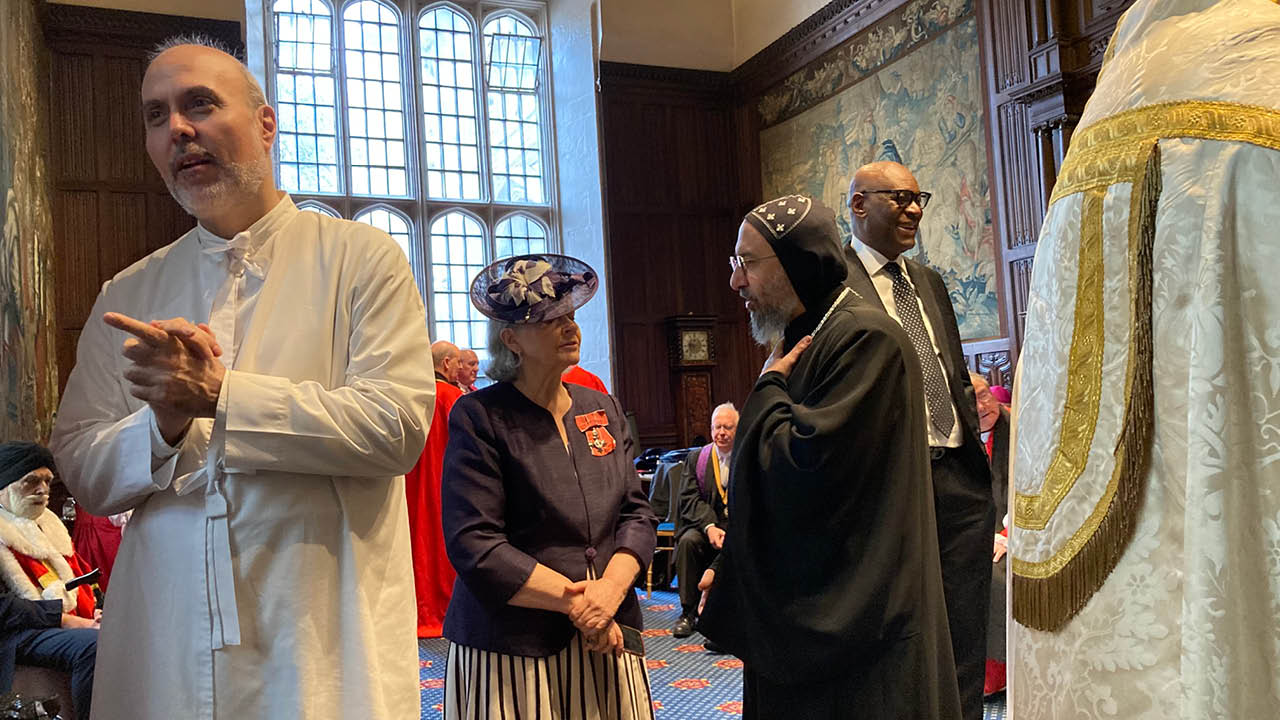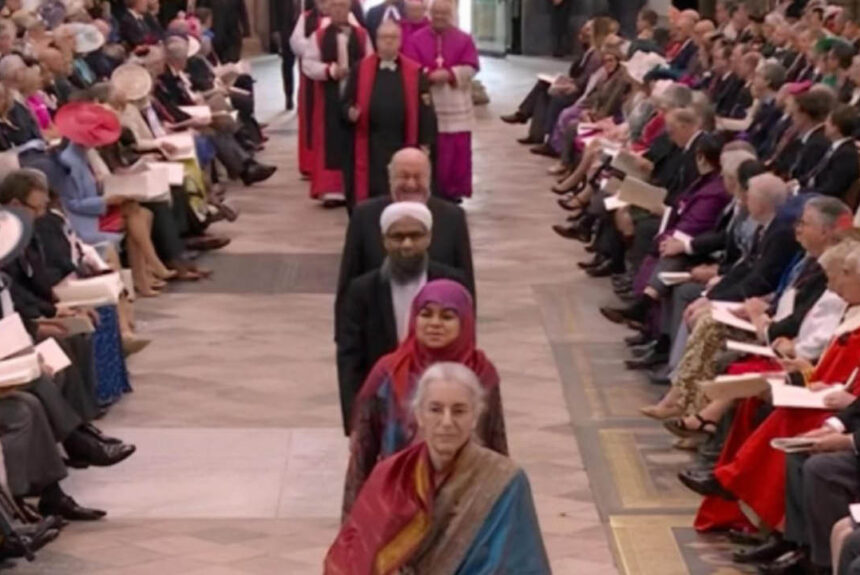By Visakha Dasi (Temple President)
Wanting to recognise and honour the contribution of diverse faith communities to modern Britain, as well as to encourage harmony amidst such communities, King Charles III of the United Kingdom featured leaders of different faiths in the regal pageantry of his coronation. In the history of British coronations, which date back a thousand years, it was the first time that faiths other than Christianity were included. As the representative of Bhaktivedanta Manor at this gala event, I was honoured and delighted to stand together with respected leaders of other spiritual paths.
Two days before the coronation, the small group of us ‘faith leaders’ gathered for a dress rehearsal in the Jerusalem Chamber of Westminster Abbey, an ancient, tapestried room where, we were told, King Henry IV had died in 1413. The Sikh, Jewish, Muslim, Zoroastrian, Baha’i, Buddhist, and Hindu leaders present were jovial and accepting of me and each other, all of us sharing the anticipation of our small role in the event soon to come. Although it was just a dress rehearsal, the pomp and regalia the British are renowned for were on full display. As one of the Christian leaders donned a magnificent crimson velvet robe replete with silver embroidery, I said to my newly-made Baha’i friend, “There must be a long history behind that,” at which the Christian leader, now fully adorned, turned and told us, “This was first worn in 1660 when Charles II was King,” smiled and left to practise his role.
Our group was authoritatively told when we would enter the Abbey, how we would walk up the centre aisle, where we would sit, and what we could and could not do during the event. We practised twice and then watched as the other coronation participants, including many military personnel, priests, choir and orchestra members, ran through their various responsibilities and contributions. I was astonished by the magnificence of Westminster Abbey, its sacred spaciousness, its brilliant stained glass, its dozens of organ pipes that soared upward toward the vaulted ceiling, and even its daunting network of tiny microphones suspended above the choir and orchestra. Every detail of the ceremony was minutely choreographed, scripted, and timed; nothing was left to chance.
The place, procedures, oaths, and investiture, all steeped in tradition and historicity, had deep significance that was mostly unknown to me and those around me. During the actual coronation, however, what impressed me most was how God-centric it was.
At 11am on May 6th, 2023, after thousands of powerful, talented, affluent, aristocratic, and well-known guests from throughout the world had arrived and been escorted to their respective named seats, everyone stood up as the King and Queen and their escorts entered and unhurriedly proceeded through the centre of the massive Abbey to the Altar. The first person to speak was a spiffily-uniformed small boy who said, “Your Majesty, as children of the kingdom of God, we welcome you in the name of the King of kings.” King Charles replied, “In His name and after His example I come not to be served but to serve.” Then he and the Queen remained standing before the Altar in silent prayer.
In the Gita, Sri Krishna declares, “Among men I am the monarch,” and Srila Prabhupada explains that, “Amongst the human beings, the king is the representative of Kṛṣṇa because Kṛṣṇa is the maintainer of the universe, and the kings, who are appointed on account of their godly qualifications, are maintainers of their kingdoms. Kings like Mahārāja Yudhiṣṭhira, Mahārāja Parīkṣit and Lord Rāma were all highly righteous kings who always thought of the citizens’ welfare. In Vedic literature, the king is considered to be the representative of God. In this age, however, with the corruption of the principles of religion, monarchy decayed and is now finally abolished. It is to be understood that in the past, however, people were more happy under righteous kings.” (Gita 10.27)

That rainy Saturday morning, while we were in the hallowed and cavernous hall of Westminster Abbey, in faraway parts of the world wars were raging, powerful leaders were vying with each other, and countless families were struggling to survive. From the King’s pledge “not to be served but to serve,” I got a glimmer of how a God-conscious kingdom under a benevolent and exemplary God-conscious king could be sublime.
Later in the proceedings, the King knelt before the Altar and said, “God of compassion and mercy…give grace that I may find in Thy service perfect freedom and in that freedom knowledge of Thy truth.”
In Krishna consciousness we understand that the “freedom” the King requests of God is freedom from the influence of material modes of nature, namely ignorance, passion, and goodness. These modes evoke lust, greed, anger, and envy in us, inhibiting our spiritual understanding and progress and binding us to this world. One who transcends the modes of nature by the mercy of guru and Krishna and by the practice of bhakti yoga sees all living beings equally, knowing that each soul is part of God and is loved by God. Krishna says,
vidyā-vinaya-sampanne
brāhmaṇe gavi hastini
śuni caiva śva-pāke ca
paṇḍitāḥ sama-darśinaḥ
“The humble sages, by virtue of true knowledge, see with equal vision a learned and gentle brāhmaṇa, a cow, an elephant, a dog and a dog-eater [outcaste].” (Gita 5.18)
The King continued his prayer, saying “Grant that I may be a blessing to all Thy children, of every faith and belief, that together we may discover the ways of gentleness and be led to the paths of peace.”
Sri Krishna explains that to attain peace we need to realize that He is the supreme proprietor of everything, He is the supreme enjoyer of it all, and He is the most dear, well-wishing friend of all beings.
Ideally, the King takes counsel from wise brahmanas and governs accordingly for the pleasure of God and the benefit of the citizens. During the coronation the Archbishop of Canterbury prayed to God on behalf of King Charles, “As King he may know the abundance of Thy grace and the power of Thy mercy, and that we may be made a royal priesthood, a holy nation, a people for Thine own possession.” And just prior to placing the crown on the King’s head, he said, “May he be crowned with Thy gracious favour and filled with abundant grace and all princely virtues.” Then the King was crowned and the magnificent choir filled the Abbey with the words, “Be strong, and show Thy worth: keep the Lord thy God, and walk in His ways.”
The pomp, the regalia, the pageantry and splendour, the tradition and historicity of it all was to solemnize the King as God’s loyal, steadfast, and worthy servant and representative.
That evening I looked at an app on my phone, which I’d had with me the whole day, and saw that I’d taken 7,312 steps since the early morning. A few dozen of those steps were in a procession with other faith representatives down the centre of Westminster Abbey at the request of a King who seeks inclusivity. I felt grateful for his broad vision, for there is, after all, one God who is worshipped in myriad ways by pious people throughout the world.
Bhaktivinoda Thakura instructs us in the proper attitude to have toward followers of spiritual paths and traditions that are not our own. Witnessing other’s spiritual practices we can think, “Here my Lord is being worshipped in a different form. Since I am committed to my particular practice, I cannot take part in this ritual, but as I watch it, I am developing a greater feeling for my own method of worship. The Supreme Absolute Truth is one without a second. Therefore, as I offer my obeisances to the form which I see here, I pray to my Lord, from whom this form comes, that this Deity will help me expand my love for Him.”
After the coronation, still dressed in a sari and wearing tilak, I stayed back for a bit to mingle with a few of the elite guests and members of the clergy. I could feel that some of the guests and clergy embraced the King’s mood of openness – one of his oaths had been to “seek to foster an environment in which people of all faiths and beliefs may live freely.” Other guests and clergy were less welcoming, and still others not at all.
Then I met the Most Reverend and Right Honourable Justin Welby, Lord Archbishop of Canterbury, who had just presided over the three-hour coronation ceremony. I thanked him for conducting the proceedings with such confidence, grace, and spiritual authority, and also with an approachable mood. Archbishop Welby listened to me attentively, appreciated my words, looked directly at me and said, “I’m glad you could be here today.” He excused himself to change his weighty robes for something more informal, reappeared a few minutes later in simple purple cotton robes, and stood at a doorway to wish the attendees well as they departed.
As I left Westminster Abbey, I had a strong desire to invite King Charles and the Archbishop to Bhaktivedanta Manor to experience the spiritual sanctuary Srila Prabhupada and his followers have created there. I think both of them would be pleased by the mood of devotional service to God, to God’s creation, and to God’s created beings that permeates that holy place.

